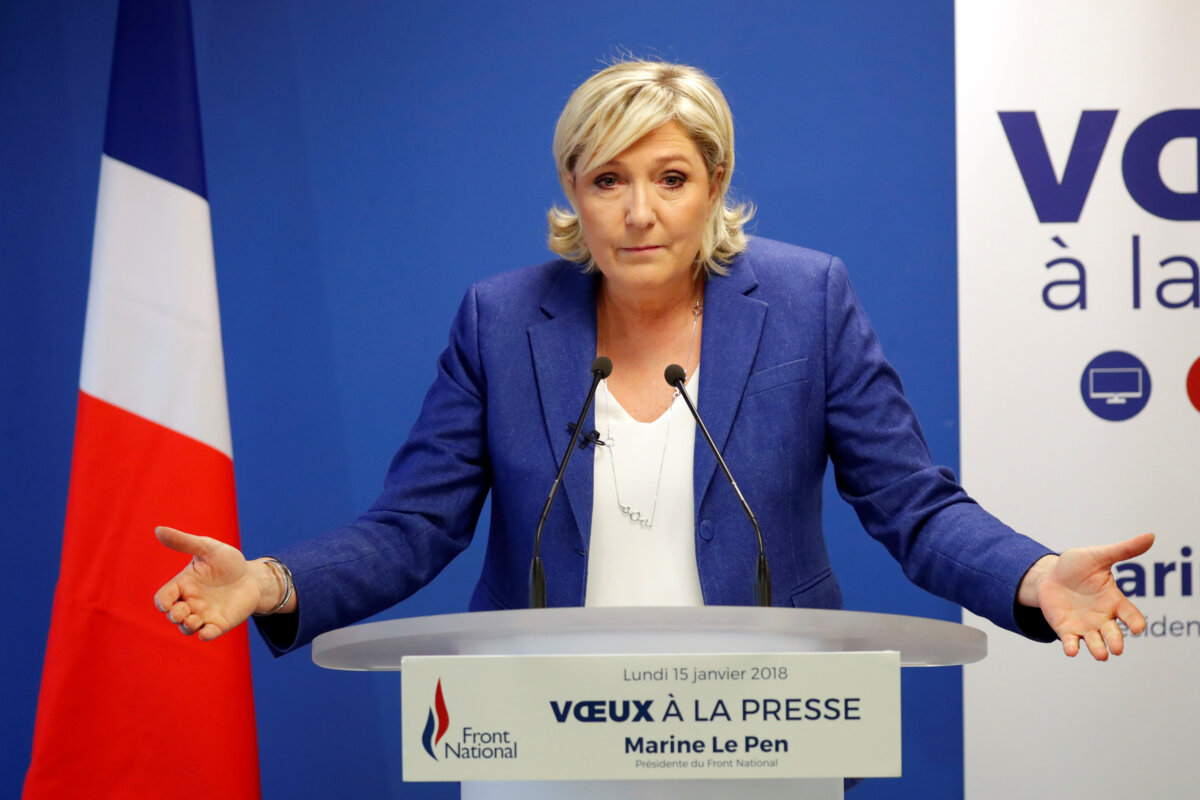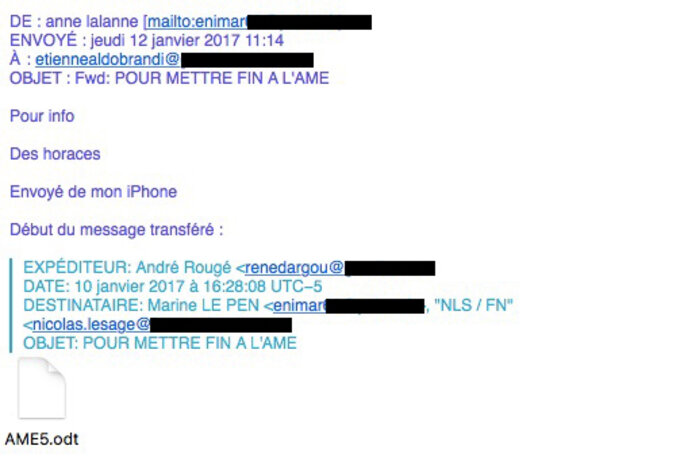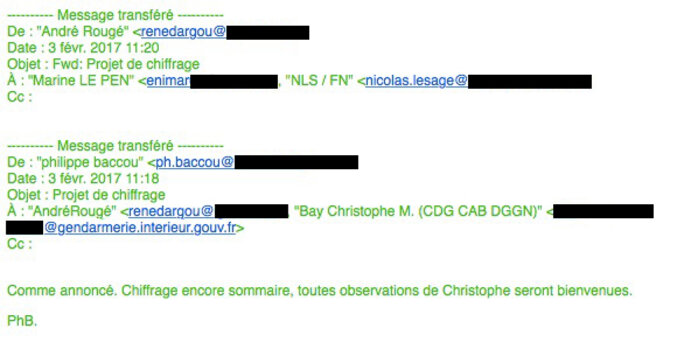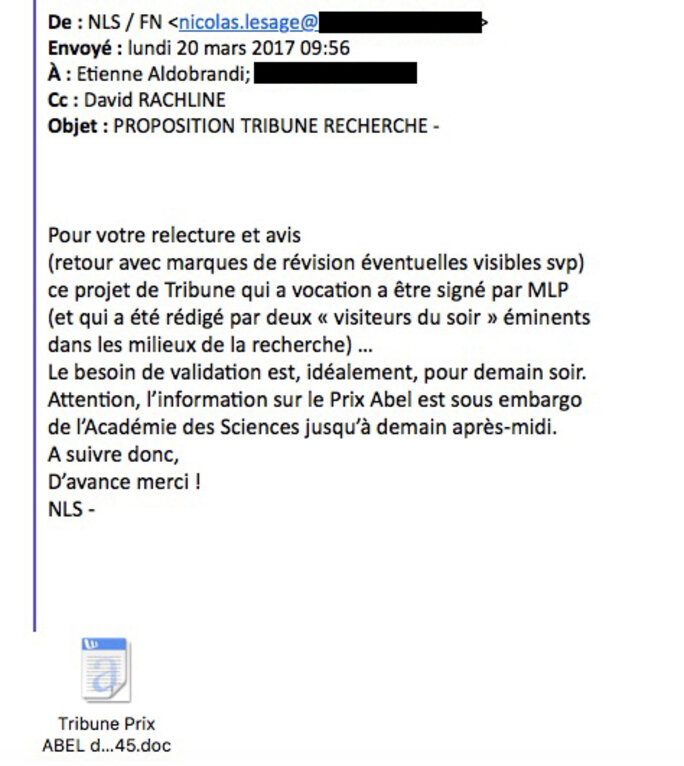In a joint investigation, Mediapart and BuzzFeed have obtained documents, emails and photos which reveal how several senior French civil servants acted as discreet advisors to the 2017 presidential election campaign of far-right Front National party leader Marine Le Pen.
They include former members of France’s Council of State and the French national audit body, the Cour des Comptes, a prefect and advisor to the director-general of the French gendarmerie, and a director of a major French construction firm.
Most of them, all graduates of Frances elite higher education schools and institutions, including the ENA administration school, the Sciences-Po institute of political sciences and the Université Panthéon-Assas Sorbonne law school, were once associated with the conservative RPR party (now re-named Les Républicains) before taking up ministerial posts under the presidencies of Jacques Chirac and his successor Nicolas Sarkozy.
Their help to Le Pen, sometimes carried out under a pseudonym, ranged from offering advice during specific consultations, redacting advisory reports and, in the case of some, taking part in internal party meetings.
The Front National (FN) has a tradition of using unofficial advisors. During last year’s election campaign, the party made known that it was assisted by consultant figures who had served the French foreign ministry, the finance ministry, the ministries of defence and the interior, and also the banking and private corporate sector, but without releasing their names.
In the run-up to the previous election campaign of 2012, FN leader Marine Le Pen boasted of being helped by a group of about 50 “experts” in various fields who gave their services in secret because, according to one of her entourage cited by French daily Le Parisien, “some work in major ministries, they could be taking risks for their jobs if they exposed themselves more”. The daily carried an interview with a man whose identity was concealed behind the name of “Adrian”, who was presented as a “senior civil servant” with the economy ministry. The pseudonym hid Florian Philippot, who was to become FN vice-president in charge of strategy and communication (he left the party last September following its debacle in the 2017 elections), and who was in fact a senior civil servant with the General Inspectorate of the Administration (IGA), which operates under the interior ministry.
Philippot’s brother, Damien Philippot, director of political studies at French polling and market research agency IFOP, was a secret advisor to the FN before publicly revealing his contribution to the party in 2016.
Another secret advisor to the party who later publicly revealed his association with the FN when he successfully gained a seat in the 2014 European Parliament elections was Bernard Monot, who previously hid behind the pseudonym of Nicolas Pavillon. Monot, formerly with the French public financial institution the Caisse des Dépôts et Consignations and the French corporate and investment bank Natixis, was one of the team who shaped Le Pen’s economic programme for her 2012 presidential election campaign.

Enlargement : Illustration 1

That collaboration of senior expert figures during the 2012 election campaign was repeated in Le Pen’s campaign in 2017, with the creation in early 2016 of a group called “Les Horaces”, which included senior civil servants, business leaders, military figures and magistrates. While the party boasted of their numbers as being “about 60”, in reality those that took part in close advisory collaboration with Le Pen were a handful. The only one of them who revealed his identity in public was the group’s spokesman, Jean Messiha, a graduate of ENA and Sciences-Po.
Another advisory group dedicated specifically to shaping Le Pen’s economic programme, headed by Bernard Monot and called Cap Éco, all also supplied their services in secret, using, when necessary, pseudonyms.
“We work with big names, from the senior civil service, the private economic sector, the major groups of the CAC 40 [benchmark French stock market index], tax affairs directors from international groups,” one leading FN official, whose name is withheld, told Mediapart. “Eighty percent have asked to remain anonymous. We gave them that guarantee, on word of honour. Does Coca-Cola give out its manufacturing secrets? ”
The FN’s secrecy might, at least in part, be because those identified by Mediapart and BuzzFeed are very removed from the party’s “anti-elite” stance, in which it denounces a caste disconnected from the people, and the political influence of technocrats and the diktat of business leaders. “It’s the system that pretends to take on new faces, to lobotomise the French people by trying to pass itself off as a new offer, whereas they’re nothing other than a recycling of previous presidential terms,” declared Le Pen at a meeting in Bordeaux on April 2nd last year during her presidential campaign. In France’s 2007 presidential and parliamentary elections, the party’s programme included abolishing the ENA administration school.
But the backgrounds of those advisors to the FN identified in this investigation closely resemble what the party’s leader denounced, graduates of the elite higher education schools, an older generation who are veterans of ministerial posts.
One of them is André Rougé, 56, a director of commercial development with a large construction group. A graduate of the Université Panthéon-Assas Sorbonne law school, he has served as an advisor in several ministries, including that for overseas territories in 1993 and again in 1997, and the ministry for social integration in 1995.
Rougé has a long association with the former Gaullist RPR party, as a member of the cabinet of its leader Jacques Chirac when he was mayor of Paris and up until the latter's successful 1995 presidential election campaign, when Rougé was in charge of coordinating it in France’s overseas territories. In the fake jobs scandal at Paris City Hall under Chirac’s term as mayor, when it was revealed that members of his RPR party were fraudulently placed on the City Hall payroll, Rougé was named as one of the RPR cadres remunerated by the capital's taxpayers.
When Chirac dissolved parliament in 1997, a political miscalculation that saw his socialist opponents win the ensuing elections, Rougé created an informal networking group called “Richelieu”, whose purpose was to help those conservative allies who lost their jobs in ministries find new employment, and which was to provide candidates for recruitment to an association called “The friends of Jacques Chirac”. Rougé subsequently entered the private sector in 2001.
Rougé helped Marine Le Pen’s 2017 presidential campaign chiefly by writing up advisory reports, using an anagram of his name to create the pseudonym "René Dargou". In an email exchange dated January 10th 2017, reproduced below, he wrote to Le Pen and her inner cabinet chief, Nicolas Lesage, to transmit a document entitled “To put an end to AME”, which was a reference to State-funded medical aid, which Le Pen then transferred on to Damien Philippot with the message, “FYI, the Horaces” – the name given to the secret advisors.
In the email exchange, Le Pen uses the maiden name of her mother, Lalanne, and Damien Philippot uses the pseudonym Etienne Aldobrandi.

Contacted on several occasions by Mediapart and Buzzfeed, André Rougé did not respond to our questions.
According to one FN official, Rougé is “an old friend of Marine’s”, describing him as “head of the Horaces”, who played an “important” role in establishing Le Pen’s 2017 election manifesto.
On his public Facebook account, in his real name of André Rougé, which indicates his date of birth and which is directly linked to his professional email address, he is in contact with several people close to Le Pen, including her former chief-of-staff Philippe Martel and her longstanding friend Frédéric Chatillon.
Among the about 200 “friends” of the account are various rightwing politicians, including also former militants, of the same generation, of the disbanded far-right student group GUD, including Jildaz Mahé O’Chinal, Patrick Klein and Marcello de Angelis, an Italian former neofacist.
'I'm a senior civil servant, I don’t talk politics in public'
Another of the secret advisors is Jérôme Turot, 63, a lawyer specialised in tax affairs. A graduate of Sciences-Po and the ENA (where he was in the same class year, dubbed ‘Voltaire’, as former president François Hollande, and also Hollande’s longtime partner, the former minister and Socialist Party veteran Ségolène Royal, and former conservative French prime minister Dominique de Villepin), Turot served in the inner cabinet of the justice ministry between 1986 and 1987, under Jacques Chirac’s first government when the latter was prime minister, before creating his own law firm in 1993.
During the FN leader’s 2017 election campaign he was in direct contact with Le Pen and Rougé, sending them in March last year an amended version of a text on pension reforms.
According to Mickaël Ehrminger, a party official who took part in the Le Pen campaign, Turot and Rougé appeared together at the campaign headquarters “to talk about health and fiscal policies” for the candidate’s programme. “The meeting, with Marine Le Pen, lasted more than one hour,” recalled Ehrminger. “They provided points and their opinions on those broad lines that we had developed. Subsequently, they came to the HQ on several occasions, either together or separately.” Ehrminger’s account was supported by another former campaign official.
Contacted by Mediapart and Buzzfeed by email, Turot did not respond to our questions. When contacted by phone at his law firm, he said, “This is rubbish, I’ve nothing to say to you,” and hung up.
Among the internal email correspondence during Le Pen’s campaign, consulted by Mediapart and Buzzfeed, senior civil servant Christophe Bay is shwon to have been contacted via his professional email address. Bay, a prefect who was appointed to the cabinet of the Director-General of the French gendarmerie, the DGGN, was contacted on February 3rd 2017 by another senior civil servant with a document entitled “Assessment of local public administration savings”. The correspondent, who referred to Bay by his first name, asked him for his “observations” on the “assessment” contained in Le Pen’s campaign programme (see below).

Bay, 55, is another graduate of the Sciences-Po and ENA schools, who in his early years was a militant with the Union of Students of the Right, the UED, a group which argued for an alliance of all rightwing supporters, and whose members included both those of the conservative and far-right, and which was for some a replacement to the then-dissolved GUD.
He has had a lengthy career as a civil servant (see here, in French). Beginning in the 1990s, he served in various ministries, including that for overseas territories in 1994, under a conservative government, then the interior ministry in 2000 under a socialist government and, later, at the immigration ministry between 2008 and 2011, under the conservative administration of Nicolas Sarkozy, when he was appointed deputy chief-of-staff to then minister Brice Hortefeux.
Afterwards, Bay served successively as prefect of the Aube and then Dordogne départements (administrative regions equivalent to a county). According to a study entitled Sans-papiers & préfets, la culture du résultat en portraits (“Illegals and prefects, portraits of the culture of numbers") published by the Cette France-là association, a collective which promotes a critical counterview of government policies towards migrants, Bay proved to be particularly zealous in organising the deportation of so-called "illegals" – migrants who had no legal status of residence – expelling them before they had a chance to appeal the decision. “Since [his] arrival as head of the Aube prefecture in the Spring of 2011, life in [the town of] Troyes is rhythmed with the arrests of illegals,” wrote the authors of the study.
In 2015, during the state of emergency established by the then-socialist government of François Hollande, following devastating terrorist attacks in France that year, Bay used the new powers given to himl as prefect to order a series of house searches that exceeded the average number ordered by other prefects.
In October 2016 he was appointed to the cabinet of the director-general of the gendarmerie (DGGN) as advisor on security and territorial affairs. Neither Bay, who was contacted by Mediapart on several occasions, nor the DGGN, responded to our request for an interview.
Another secret advisor to Le Pen’s campaign was Philippe Baccou, 69, whose academic profile represents the summum of perceived excellence: another graduate of the Sciences-Po institute of political sciences, and the Université Panthéon-Assas Sorbonne law school, he is also a graduate of the ENA administration school. He too has enjoyed a career in the senior sphere of the civil service and was notably a senior advisor to France’s national audit body, the Cours des comptes. In March 2017 he was appointed to France’s national Committee for Fiscal, Customs and Currency Litigation. According to a member of the FN politburo, during Le Pen’s presidential bid Baccou “had an important role, he quite frequently intervened in the assessments of the economic programme”. The party official added: “He was invisible and covered by a pseudonym. He was a [party] supporter for some while, he worked with the Cap Éco and with the Horaces. He ‘came out’ after applying for retirement.”
Baccou’s political allegiances were however previously illustrated by his membership of the Club de l’Horloge, a networking circle that brings together figures from both the mainstream conservative movement and the far-right, alongside Jean-Yves Le Gallou and Henry de Lesquen, both former senior civil servants and ENA graduates, and both outspoken supporters of the far-right. In 2017, Henry de Lesquen, an associate of the far-right think tank Polemia, was convicted of provoking hate crimes and denial of the Holocaust, for which he was fined 16,000 euros.
Baccou took part in several meetings with the FN to develop Le Pen’s manifesto, and his contributions appear in documents and email exchanges. In a photo obtained by Mediapart and which was taken in January 2017, he is seen sitting alongside FN MEP Bernard Monot and another campaign advisor, Georges Tissié, 64, a former social affairs director for the French confederation of small- and medium-sized businesses, the CPME, and who now sits on the board of a major bank. An official with the FN, whose name is withheld here, said of Tissié that, “We worked very well with him”.
Tissié was one of several advisors to Le Pen’s campaign who was a member of both the Horaces and the Cap Éco groups of experts, as was also former ENA graduate Vincent Uher. The latter’s contributions appear in six documents obtained by Mediapart and Buzzfeed: five of these are summaries of proposals for Le Pen’s programme concerning fiscal policies, professional training, foreign policies and housing, and also a prepared statement on tax for small- and medium-sized businesses.
Uher is a specialist on tax matters, a graduate of Sciences-Po where he was elected as president of the UNI and, again, notably a graduate of ENA. On leaving the elite administration school in 2011 he served in the economy and finance ministry before being appointed as a legal counsel to the Council of State, France’s highest administrative court. In July 2017, he was given a senior post at the National Court of Right to Asylum. The FN official cited anonymously above, said he remembered Uher as being “very dogmatic”, adding: “He came to meetings from time to time and gave notes to Marine [Le Pen]. We took what he said into account, but like also 15 others.”
Contacted by Mediapart, neither Philippe Baccou, nor Georges Tissié, nor Vincent Uher returned our request for an interview. Mediapart eventually reached Uher by phone, when he declared that he had “no comment to make”, adding that, “As you know I am a senior civil servant, I have a duty of confidentiality and so I don’t publicly talk about politics, all the less so with the press”.
The name of another senior civil servant, Frédéric Guillaud, appears in a Le Pen campaign document, but Mediapart was unable to determine the precise role he may have played. Guillaud, 43, who is secretary to the board of a major public-sector corporation, appears, according to the document, to have been, in March 2017, responsible for a project for a presentation on the future of research activities. The document was sent by Nicolas Lesage, Le Pen’s chief-of-staff, by email (see below) to Damien Philippot et David Rachline, FN mayor of the southern town of Fréjus who was director of Le Pen's campaign.

A graduate of the Ecole Normale of advanced studies, who passed the highly competitive aggrégation exam to enter the higher echelons of the French education system, specialised in philosophy, and the author of several books on Catholicism, Frédéric Guillaud became a ministerial advisor under the successive governments of presidents Jacques Chirac and Nicolas Sarkozy. In 2010, half-way through Sarkozy’s presidency, he became the head of studies for the ruling conservative UMP party (now renamed Les Républicains). Contacted by Mediapart, he said he did not understand how his name appeared in the FN document, and suggested it might rather involve a “namesake”, before refusing to comment any further.
Nicolas Lebourg is a French historian specialised in the activities of the French far-right. He said he believed that “it was normal that a section of the technocrat structure tried to find a place, as it always does, given that Marine Le Pen appeared to be on the path to power”.
“Marine Le Pen asks them to be loyal to her rather than to act as machines for proposing and thinking,” he added, arguing that the result is that the party failed to become professional and lost credibility. “Those from managerial classes and intellectual professions vote less for her than for her father [former FN leader Jean-Marie Le Pen]. Ten percent of them voted Le Pen in 2017, and 6% in 2012, whereas in 1988 [for Jean-Marie Le Pen] they were at 14 percent. ‘Marine-ism’ is technocracy without the competence.”
Mediapart’s requests for an interview on the subjects raised in this article were met with no response from Marine Le Pen, nor her vice-president Nicolas Bay, nor her former presidential campaign manager David Rachline and nor the coordinator of her election policy programme and spokesman for the Horaces, Jean Messiha.
-------------------------
- The French version of this article can be found here.
English version by Graham Tearse


